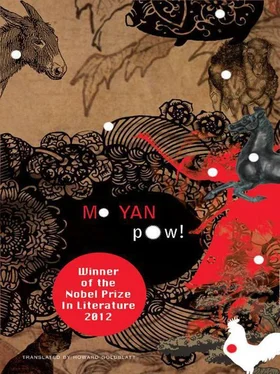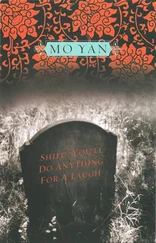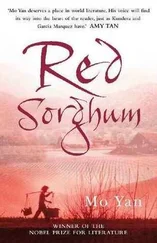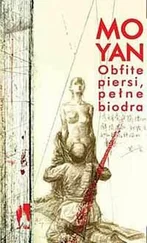Thunder rolls in the distance, like cavalry bearing down on us. Some feathers fly into the dark temple, carrying the stink of blood, like frightened children, bobbing in the air and then sticking to the Wutong Spirit. The feathers remind me of the recent slaughter in the tree outside, and announce that the wind is up. It is, and it carries with it the stench of muddy soil and vegetation. The stuffy temple cools down, and more cinders fall out of the air over our heads, gathering on the Wise Monk's shiny pate and on his fly-covered ears. The flies remain unmoved. Studying them closely for a few seconds, I see them rub their shiny eyes with their spindly legs. In spite of their bad name, they're a talented species. I don't think any other creature can rub its eyes with its legs and be so graceful about it. Out in the yard, the immobile gingko tree whistles in the wind which has grown stronger. As have the smells it carries, which now include the fetid stench of decaying animals and the filth at the bottom of a nearby pond. Rain can't be far off. It's the seventh day of the seventh lunar month, the day when the legendary herd-boy and the weaving maid—Altair and Vega—separated for the rest of the year by the Milky Way, get to meet. A loving couple, in the prime of their youth, forced to gaze at each other across a starry river, permitted to meet only once a year for three days—how tortured they must be! The passion of newlyweds cannot compare to that of the long separated, who want only to embrace for three days—as a boy, I often heard the village women say things like that. Lots of tears are shed over those three days, which are fated to be full of rain. Even after three years of drought, the seventh day of the seventh lunar month cannot be forgotten! A streak of lightning illuminates every detail of the temple interior. The lecherous grin on the face of the Horse Spirit, one of the five Wutong Spirit idols, makes my heart shudder. A man's head on a horse's body, a bit like the label of that famous French liquor. A row of sleeping bats hangs upside down from the beam above its head as the dull rumble of thunder rolls towards us from far away, like millstones turning in unison. Then more streaks of lightning, and deafening thunderclaps. A scorched smell pounds into the temple from the yard. Startled, I nearly jump out of my skin. But the Wise Monk sits there, placid as ever. The thunder grows louder, more violent, an unbroken string of crashes, and a downpour begins, the raindrops slanting in on us. What look like oily green fireballs roll about in the yard. Something like a gigantic claw with razor-sharp tips reaches down from the heavens and waits, suspended above the doorway, eager to force its way inside and grab hold of me—me, naturally—and then hang my corpse from the big tree outside, the tadpole characters etched on my back announcing my crimes to all who can read the cryptic words. As if by instinct, I move behind the Wise Monk, who shields me, and I am reminded of the beautiful woman who lay sprawled in the breach in the wall, combing her hair. Now there is no trace of her. The breach has turned into a cascade, and I think I see strands of hair in the cascading water, infusing a subtle osmanthus fragrance into the torrent…Then I hear the Wise Monk say: ‘Go on—’
My teeth were chattering. So cold! I buried my head under the covers and curled into a ball. Heat from the dead fire under the kang had long since disappeared, and the bedding was too thin to protect me from the icy concrete floor. Not daring to move, I wished I could turn into a cocooned bug. Through the bedding I heard the muffled sounds of Mother lighting the fire in the next room, the cracks of splitting firewood (that's how she vented her ire towards Father and Aunty Wild Mule). Why didn't she hurry and get the fire roaring?—that was the only way to drive the damp chill out of the room. At the same time I didn't want her to hurry because as soon as she had the fire going she'd try and get me out of bed. Her first shout would be relatively gentle; her second louder and higher and more annoyed. The third would be a bestial roar. A fourth had never been necessary, for if I hadn't rocketed out from under the covers on the third shout, she'd flick the covers off and whack my bottom with her broom. When it got that far, I knew I was doomed. For if, after the first painful whack, I jumped out of bed and onto the windowsill or scuttled out of range on the far side of the kang , she'd jump up without even taking off her muddy shoes, grab me by the hair or the scruff of my neck, press me down against the kang and really pound me with that broom. If I didn't try to get away or to resist, which she always took as a sign of contempt, her anger would boil over and she'd beat me even harder. However things progressed, if I was not on my feet by the third shout, my bottom and the poor broom were both bound to suffer. The beatings were accompanied by heavy breathing and guttural sounds—the growls of a wild animal, filled with emotion but devoid of identifiable words. But after the broom had hit me thirty times or so, the strength in her arms began to flag and the edge in her voice grew dull. The shouting would grow softer and softer and then the curses would begin—‘little mongrel’, ‘bastard turtle’, ‘rabbit runt’—followed by a verbal assault on my father. Actually, she didn't have to waste time on him, since she more or less repeated what she'd said to me, with few inventions. It was never a particularly spirited effort and even I could tell it lacked punch. When you went into the city from our village, you had to pass the little train station. When Mother finished cursing me, she made a quick pass through Father on her way to Aunty Wild Mule, her true destination. Spitting on Father's reputation, she'd move down the narrow tracks to Aunty Wild Mule. Her voice would grow louder once again, and the tears that had come to her eyes while she was cursing Father and me would be seared dry by fury. I would have invited anyone who did not subscribe to the saying ‘When enemies come face to face, their eyes blaze with loathing’ to look at my mother's eyes while she cursed Aunty Wild Mule. With my father, it was always the same few epithets, over and over, but when it was Aunty Wild Mule's turn the richness of the Chinese language was plumbed as never before. ‘My man is a stud horse reduced to fucking a jackass!’ ‘My man is an elephant humping the life out of a little bitch!’ And so on. Mother's classic curses were of her own creation but, even with their many variations, they never strayed far from the central theme. My father, truth be known, had become Mother's principal weapon in exacting revenge. Only by imagining him as a large, powerful beast, and only by depicting Aunty Wild Mule as a little frail animal victimized by his power, was she able to release the loathing that filled her heart. As she described the humiliating effect of Father's genitals on Aunty Wild Mule, the tempo of the broom-beating slowed and the force of each whack lessened until she forgot all about me. At that point, I silently got up, dressed and stood off to one side to listen, fascinated, as she continued to curse brilliantly, and a rash of concerns flooded my mind. First, I was disappointed by the curses hurled at me. If I was a ‘mongrel’, then which illicit canine affair produced me? If I was a ‘bastard turtle’, then where did I come from? And if I was a ‘rabbit runt’, who was the mamma bunny? She thought she was cursing me but she was cursing herself. When she thought she was cursing my father, she was also cursing herself. Even the curses she poured on Aunty Wild Mule, when you think about it, were pointless. My father couldn't turn into an elephant or a stud horse in a million years and, even if he did, how was he supposed to mate with a bitch? A domesticated stud horse might mate with a wild mule, but that would only happen if the mule was willing. Of course I'd have never revealed any of this to Mother—I can't imagine what that would have led to. Nothing to my advantage, that's for sure, and I wasn't stupid enough to go looking for trouble. After she'd tired herself cursing, Mother would cry, buckets of tears. Then, after she'd cried herself out, she'd dry her eyes with her sleeve and walk out into the yard, dragging me along, to begin earning the day's wages. As if to make up for the time wasted beating, cursing and crying, she'd double her speed of activity. At the same time, she'd keep closer watch on me than usual. All this illustrates why a kang that was never warm enough held little attraction for me, and all it took to wake me up was the crackling sounds of the stove, whether or not Mother shouted at me. I'd clamber into clothes that were as cold as a suit of armour, roll up the bedding, scurry off to the toilet to pee and then stand in the doorway, hands at my sides, waiting for Mother to tell me what to do. As I've said, she was more than frugal, she was downright mean and not given to casually lighting a fire. But the cold, dank rooms once made us both as sick as dogs: our knees swelled up bright red, our legs grew numb and we had to spend quite a bit on medicines before either of us was back on our feet again. The doctor warned us: If we planned to go on living, we had to warm up the house to burn the chill off the walls. ‘Coal is cheaper than medicine,’ he said. Mother had no choice but to set up a stove. So she went to the train station and bought a tonne of coal to heat our new house. How I wished the doctor had said: ‘Unless you're in a hurry to die, you have to start eating meat.’ But he never did; in fact, the quack told us not to eat greasy food, to follow a bland, and if possible vegetarian, diet. It would not only keep us healthy but also help us live longer. Arsehole! He should have known that after Father ran off we were reduced to eating plain food every day, as plain as a funeral procession, as plain as snow on a mountain peak. Five long years and I'll bet the strongest soap in the world couldn't scrape a drop of grease off my intestines.
Читать дальше












